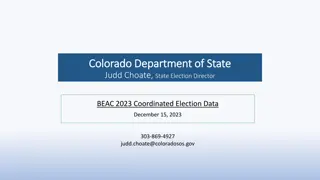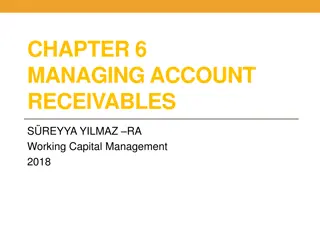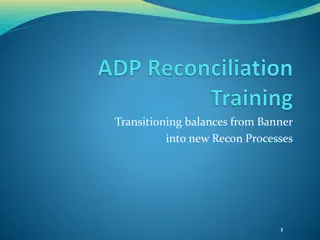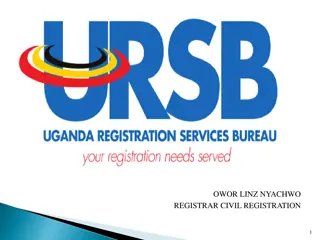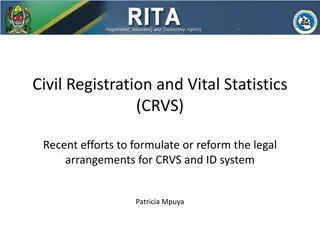Online Registration of Interests in Receivables: All About Interests and Priority Positions
Delve into the intricacies of online registration of interests in receivables, understanding the significance of registration, the impact on priority positions, and the necessity of proper documentation. Explore the current positions in receivables financing, priority rules in assignments, the effects of registration (or lack thereof), and the crucial requirements for both companies and non-company entities. Unearth the importance of publicizing a financier's interest in an asset, securing priorities over other creditors, and ensuring compliance with registration deadlines for maintaining legal standing. Gain insights into why registration matters and how it influences financial transactions.
Download Presentation

Please find below an Image/Link to download the presentation.
The content on the website is provided AS IS for your information and personal use only. It may not be sold, licensed, or shared on other websites without obtaining consent from the author.If you encounter any issues during the download, it is possible that the publisher has removed the file from their server.
You are allowed to download the files provided on this website for personal or commercial use, subject to the condition that they are used lawfully. All files are the property of their respective owners.
The content on the website is provided AS IS for your information and personal use only. It may not be sold, licensed, or shared on other websites without obtaining consent from the author.
E N D
Presentation Transcript
Professor Louise Gullifer, University of Oxford ONLINE REGISTRATION OF INTERESTS IN RECEIVABLES: WHAT IS IT ALL ABOUT?
Why register? Give publicity of a financier s interest in an asset to others Proposing to buy the asset Proposing to take a security interest in the asset Proposing to lend money or extend credit to the owner of the asset To preserve priority over anyone taking an interest after you
The current position in receivables financing If Client is a company and security interest (mortgage or fixed or floating charge) created MUST be registered within 21 days in Register of Company Charges Electronic form Scanned certified copy of charge document If not registered, void against other secured creditors and on insolvency If Client is a company and Absolute assignment (purchase) of receivables Cannot register in Register of Company Charges
The current position in receivables financing (priority) Rule in Dearle v Hall First to give notice to debtor has priority UNLESS knows (or ought to know) of previous assignment or charge when took assignment If no notice to debtor First in time to be created (not to be registered) wins
The current position in receivables financing (priority) Effect of registration (or lack of it) Registration (of security interests) gives actual notice or constructive notice to those who are expected to search the register Unregistered interests (eg of purchaser), no constructive notice No means of public notice Have to give notice to debtor to secure priority Risk in non-notification financing Subsequent financier cannot discover unregistered purchase by searching register
The current position in receivables financing If Client is NOT a company Must register a general assignment of existing and future book debts (or any class thereof) in the Bills of Sale register (s.344 Insolvency Act 1986) within 7 days Includes absolute assignment and security interest Priority position as above
Proposed Online system One registration for whole relationship between financier and client Online registration, in advance of final transaction (if desired) Applies to security interests over, and purchases of, receivables Priority by date of registration Unregistered interests void in insolvency Purchases not treated as security interests for other purposes egno accounting for surplus Could apply to both corporate and non-corporate clients
Systems already in place USA: Article 9 Uniform Commercial Code Canada: Personal Property Security Acts in every province New Zealand: Personal Property Securities Act 1999 Australia : Personal Property Securities Act 2009 Jersey: Secured Interests (Jersey) Law 2012
How does it work? Example: part of Australian PPSA tutorial http://www.ppsr.gov.au/Help/Tutorials/Pages/d efault.aspx#CR
What does it cost? Australia: Registration of duration under 7 years between 7 years and 25 years Unlimited Search of register $8 $40 $140 $4 New Zealand Registration Search of register $20 $3 Ontario Registration of duration Up to 25 years Search of register $8 a year $8
Benefits All interests on register: total transparency No need to give notice to debtor to protect priority Priority rules clear and simple
More information and this presentation Available at http://securedtransactionslawreformproject. org/ Slides at news and events tab






